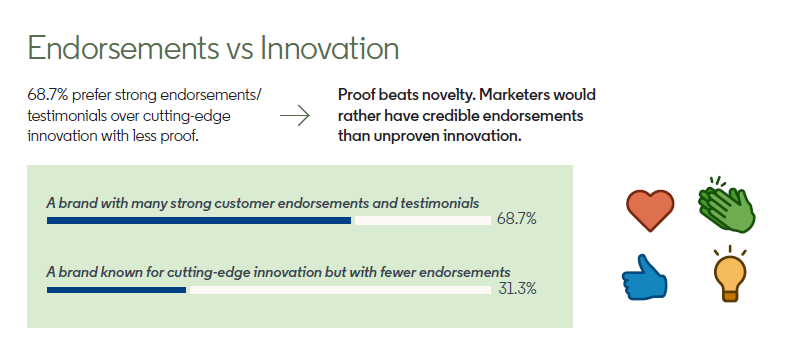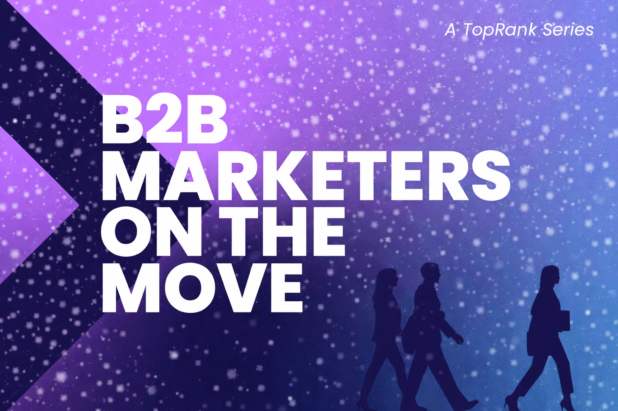LinkedIn just released its new 2025 B2B Marketing Benchmark: The Influence Report (pdf) featuring in-depth analysis from authors Mimi Turner and Jann Schwarz.
It’s another great piece of original research from our friends and clients at LinkedIn, and within the report there are plenty of revealing insights for B2B marketers who want to better understand:
- What buyers really care about
- How brand trust is built in meaningful ways
- Why B2B influencers are pivotal in shaping perceptions
The full report is very much worth diving into, but here we’ll unpack a few of the findings we found most striking, while adding context via our own B2B marketing agency perspective and data.
The big takeaway: “There’s no such thing as being trusted in secret”
This is the primary message that the report aims to get across. Trust-building doesn’t happen on its own, and it’s not merely a tactic but rather a philosophy that should guide marketing strategies throughout the funnel.
LinkedIn’s benchmark data shows that nearly 94% of B2B marketers believe building trust is the most important factor for achieving success as a brand. That’s not surprising to us – we’ve been writing about this vital marketing objective for many years — and it’s probably not surprising to you, but the mechanics of influence and trust are changing alongside the new digital landscape.
Here’s where Turner and Schwarz advise setting your strategic gaze.
Set up your strategy to showcase social validation
According to the report, “marketers believe that social validation from customers and peers has more influence on whether brands are trusted than product attributes, price competitiveness or brand awareness.”
Again: no big surprise here. It only makes sense that customers would lend more credibility to what actual customers and users are saying versus what a company says about itself. And yet, so many brands are overwhelmingly focused on talking about themselves.

Having said that, attaining customer testimonials, case studies and endorsements is not always easy. It can be a big ask. But remember: if you’re doing a good job, your satisfied customers will want you to stay in business and be successful. They will be happy to share their experience with your brand. As uor CEO Lee Odden has said for many years, “The best investment you can make in marketing is the quality and experience of your “product”. So don’t be afraid to broach the conversation in an honest way and explore what’s possible.
One approach we recommend in situations like these is creating proof content that treats your customer as the hero, as much as (or more so than) your own brand. Think about case studies as dual marketing assets that showcase the capabilities of both your company and the teams you helped overcome obstacles and achieve their goals. This not only reduces friction when it comes to getting approvals on publishing the content, but can also compel customers to share it out in their networks more enthusiastically.
In tandem with working to secure and showcase this social validation content from customers, you can also work to establish relationships with well-known and respected voices in your industry to bolster your third-party brand affirmation.
B2B influencers are most impactful at the mid-funnel stage
For their research, LinkedIn asked B2B marketers how they feel they can best differentiate their brands from close competitors at each stage of the funnel. When it comes to that crucial middle stage where shortlists are shaped, validation from impartial experts was the winner.
“Being named the top solution by analysts/industry experts got the biggest vote (37.9%), while customer testimonials (video: 34.3% and written: 34.1%) also stood out,” according to The Influence Report. “Both were more valued than content produced by the company itself. In fact, endorsements from experts were 1.7x more likely to give a brand the edge over a rival compared to written content from the company itself.”
21% of B2B marketers say one of their biggest obstacles to trust is that their brand does not have enough third-party endorsements. (The Influence Report from LinkedIn)
It’s just another data point illustrating something we have seen time and time again: influencer marketing makes a decisive impact at the most crucial stage of the buying journey, and can help foster mutual confidence across buying groups.
When you engage with influencers over time and solidify relationships, the advocacy tends to become more genuine, knowledgeable and resonant in the eyes of audiences. This helps explain why 99% of marketers using always-on influencer strategies rate their programs as effective, per TopRank Marketing’s 2025 B2B Influencer Marketing Report.
LinkedIn’s research also drives home the impact of one specific type of influencer: micro-influencers, which Lee Odden recently described as “individuals with between 1,000 and 50,000 followers, [who] bring a level of focus and credibility that larger personalities sometimes lack.”
A core point that The Influence Report aims to get across is the relative importance of relevance versus reach when it comes to creating category confidence. Micro-influencers can be extremely powerful in this regard. As one respondent shared in our survey for the B2B Influencer Marketing Report:
“One surprisingly effective tactic is using micro-influencers who have smaller but highly engaged audiences. Their genuine, niche-focused content often drives higher engagement and trust compared to big-name influencers. They create a more authentic connection with their followers, which can lead to better conversion rates for brands.”
Build social trust the right way
Trust is essential to advancing group-based purchase decisions, but it doesn’t get built on its own. People need to see to believe. A marketing strategy that treats social proof and influencer advocacy as tentpoles is designed for sustainable success. Because in B2B, you don’t own the category until you’re known in the category — and that’s got to be shown. For more insights, be sure to dig in to Mimi’s summary and the report here.
Of course if you’d like to talk to a partner with deep experience building trust and market leadership for many of the top B2B brands (including LinkedIn), reach out to our team and let’s chat.



